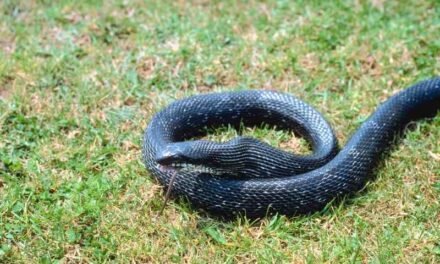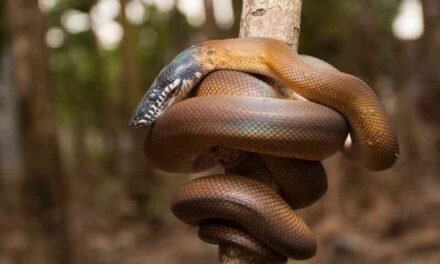The Cape Coral Cobra, also known as the Cape Coral Snake, is a venomous snake belonging to the Elapidae family and is chiefly found in southwestern Africa². It is a relatively small snake, reaching up to 3 feet in length, with a distinctive hood and black rings on its red-orange or yellow body¹. It is also one of the few snakes that can spit venom up to 10 feet², making it a potential threat to humans and pets.
If you live in an area where this snake is native or has been introduced, you may encounter it in your backyard or garage, especially at night, as it is nocturnal and likes to hide under rocks or in burrows¹. Here are some tips on how to deal with this situation safely and effectively.
Stay calm and back away slowly
The first thing to do if you see a Cape Coral Cobra is to stay calm and avoid any sudden movements that may provoke it. The snake may feel threatened by your presence and may raise its hood, hiss, or spit venom as a warning². Do not try to touch, catch, or kill the snake, as this may increase the risk of being bitten or sprayed with venom. Instead, back away slowly and keep a safe distance of at least 10 feet from the snake². If possible, use a barrier such as a door, a fence, or a broom to separate yourself from the snake.
Seek medical attention if bitten or sprayed with venom
The Cape Coral Cobra’s venom is neurotoxic and cytotoxic, meaning it can affect the nervous system and cause tissue damage¹. The symptoms of envenomation may include pain, swelling, blistering, necrosis, nausea, vomiting, difficulty breathing, paralysis, convulsions, and death¹². If you or someone else is bitten or sprayed with venom by the snake, seek immediate medical attention. Call 911 or your local emergency number and follow their instructions. Do not apply a tourniquet, ice, heat, or any other substances to the wound². Try to keep the affected area below the level of the heart and remain calm until help arrives.
Contact a professional snake removal service
If the Cape Coral Cobra is still in your backyard or garage after you have moved away from it, do not attempt to remove it yourself. Contact a professional snake removal service that has the expertise and equipment to handle venomous snakes safely and humanely. Do not use any traps, repellents, or poisons that may harm the snake or other animals². Keep children and pets away from the area until the snake is removed.
Prevent future encounters
To prevent future encounters with Cape Coral Cobras or other snakes in your backyard or garage, you can take some measures to make your property less attractive and accessible to them. Some of these measures include:
- Keep your yard clean and tidy. Remove any clutter, debris, trash, or wood piles that may provide hiding places for snakes².
- Mow your lawn regularly and trim any bushes or shrubs that may create cover for snakes².
- Seal any cracks or gaps in your walls, foundation, doors, windows, or vents that may allow snakes to enter your house or garage².
- Store any food items securely and dispose of any leftovers properly. Do not leave any pet food or water bowls outside that may attract snakes or their prey².
- Install snake-proof fencing around your yard or garden. Use mesh wire or solid metal that is at least 4 feet high and buried at least 6 inches deep. Make sure there are no gaps or holes that snakes can squeeze through².
The Cape Coral Cobra is a beautiful but dangerous snake that should be respected and avoided. By following these tips, you can reduce the chances of encountering one in your backyard or garage and protect yourself and your loved ones from harm.
Source: Conversation with Bing, 6/18/2023
(1) Snake Profile: Cape Coral Cobra (8 Incredible Pictures). https://happyserpent.com/snake-profile/cape-coral-cobra/
(2) Aspidelaps lubricus – Wikipedia. https://en.wikipedia.org/wiki/Aspidelaps_lubricus
(3) Cape Coral Cobra – Facts, Information & Pictures – Snek World. https://snekworld.com/cape-coral-cobra/









